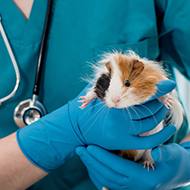
Tumour prevalence increases with age.
Tumour prevalence is higher in guinea pigs than previously thought, according to new research.
The study led by the University of Veterinary Medicine Vienna used autopsy reports collected from three pathology institutes in Germany, Austria and the USA. Of the 2,474 guinea pigs autopsied, the team found tumours in 508 cases (21 per cent of guinea pigs), and multiple tumours in 95 cases.
Leukaemia or lymphomas were the most common tumours, particularly in younger animals, with lymph nodes, liver and spleen being the most frequently affected organs. Non-lymphoid tumours were most commonly found in the female genital tract (mostly the uterus), lungs, skin, thyroid gland and gastrointestinal tract.
It had been previously considered that tumour prevalence in guinea pigs was low – based on research on laboratory animals which are typically younger. However, this new study found a tumour in one in five guinea pigs, which is higher than for pet rabbits studied at the same institution.
Moreover, the team found that tumour prevalence increased with age – from one per cent in guinea pigs under 0.5 years old to 54 per cent for animals over five years old.
The authors write: ‘Our postmortem study demonstrates a high prevalence of disseminated lymphoma or leukaemia in pet guinea pigs at the time of death or euthanasia. Additional studies are needed to further characterize these tumors.’
The research, Neoplasia in pet guinea pigs: a retrospective analysis of 2,474 autopsy examinations, is published in the Journal of Veterinary Diagnostic Investigation.



 The latest
The latest